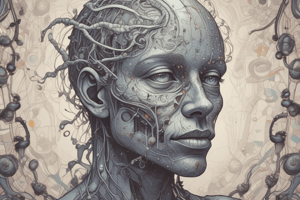Podcast
Questions and Answers
What is the role of a gene in living organisms?
What is the role of a gene in living organisms?
- Providing instructions for making proteins (correct)
- Controlling the behavior of an organism
- Determining the environment of an organism
- Regulating the temperature of an organism
What term describes the scenario where multiple genes control complex traits in an organism?
What term describes the scenario where multiple genes control complex traits in an organism?
- Monogenic inheritance
- Epigenetics
- Heredity
- Polygenic inheritance (correct)
How has genetics impacted agriculture through selective breeding strategies?
How has genetics impacted agriculture through selective breeding strategies?
- Caused soil depletion
- Enhanced resistance to pests (correct)
- Increased water usage in farming
- Reduced crop yields
Which term refers to different versions of a single gene within a species?
Which term refers to different versions of a single gene within a species?
What is the main difference between dominant and recessive alleles?
What is the main difference between dominant and recessive alleles?
How does an individual's phenotype depend on alleles from both parents in polygenic inheritance?
How does an individual's phenotype depend on alleles from both parents in polygenic inheritance?
In what area has genetic engineering made significant advancements revolutionizing food production methods?
In what area has genetic engineering made significant advancements revolutionizing food production methods?
What causes alterations in gene expression that may lead to varied traits or diseases?
What causes alterations in gene expression that may lead to varied traits or diseases?
Which field benefits from knowledge about human genetics to predict susceptibility to diseases?
Which field benefits from knowledge about human genetics to predict susceptibility to diseases?
Study Notes
Understanding Genetics in the Broad Field of Biology
Genetics refers to the scientific discipline dedicated to studying how inherited traits are passed from one generation to the next. It involves a range of interconnected topics, including the nature of genes, their mutations, and how various genetic components interact to produce diverse traits found in living organisms.
Key Components of Genetics
The field of genetics encompasses several essential concepts:
-
Gene: A segment of DNA that provides instructions for making proteins. Genes are passed down from parent organisms to their offspring and influence the observable traits of the individual.
-
Alleles: Different versions of a single gene that may be present in the same species. Alleles contribute to variation and help explain phenotypic differences between individuals.
-
Dominant and recessive alleles: Some alleles mask the effects of others when combined in an individual, resulting in distinct traits. Dominant alleles express their effect while recessive ones remain hidden unless paired with another recessive allele.
-
Mutations: Changes in DNA sequences that alter the genetic information. Mutations can occur spontaneously or due to environmental factors and can cause variations in gene expression, potentially leading to altered traits or even diseases.
-
Linkage: Linked genes are physically close together on the same chromosome. Their association affects the likelihood of simultaneous transmission of multiple traits from parent to offspring.
-
Polygenic inheritance: Multiple genes control complex traits in an organism, with each gene having its own variations. An individual's phenotype can depend on the combination of alleles from both parents.
Application of Genetics in Real Life
Understanding genetics helps us understand the causes of genetic disorders, predict susceptibility to certain diseases, and explore potential treatments. For example, knowledge about human genetics has led to advancements in medical fields like prenatal testing, personalized medicine, and targeted drug therapy. Additionally, genetics plays a crucial role in forensic science, where DNA analysis helps solve crimes.
In agriculture, selective breeding strategies based on understanding genetics have helped improve crop yields, enhance resistance to pests, and develop varieties better adapted to changing climates. Genetic engineering is also employed to introduce desired traits into crops or livestock, revolutionizing food production methods worldwide.
Moreover, genetics is connected to fields such as chemistry, physics, computer science, mathematics, and philosophy, highlighting its multidisciplinary nature. By exploring the world of genetics, we gain insights into ourselves and the intricate web of life on our planet.
Studying That Suits You
Use AI to generate personalized quizzes and flashcards to suit your learning preferences.
Description
Test your knowledge on essential genetics concepts such as genes, alleles, mutations, linkage, and polygenic inheritance. Explore the real-life applications of genetics in fields like medicine, agriculture, and forensic science. Understand the interconnected nature of genetics with other scientific disciplines.




